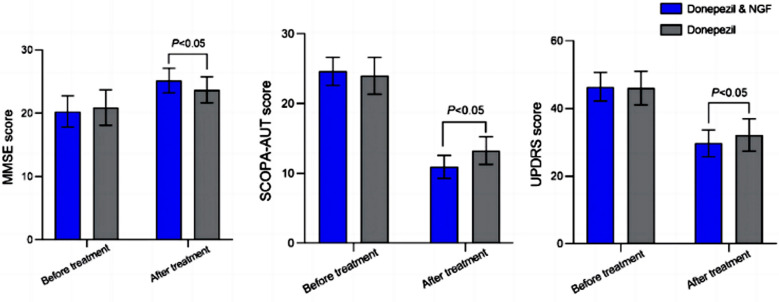Differences in disease treatment between countries are evidence that medicine is not an exact science (if there ever was one). For example, it has been shown in certain cancers that crossing a state border can offer a better chance of survival. The article that is the subject of this post takes us to China in Taizhou, in the Zhejiang province.
It seems that in Asia (China, Japan) we talk about Parkinson's disease with dementia, as distinct from Lewy body disease. This dementia is managed with donepezil, which is not done in the West where this drug is rather used for Alzheimer's disease.
Donepezil is one of those drugs with unpleasant side effects that sometimes lead to patients abandoning them.
Murine NGF (nerve growth factor) has been licensed in China since 2003. It appears to improve patient outcomes for several nervous system diseases. This is important because few drugs can treat nervous system diseases. Unfortunately, research and clinical use outside of China are limited.
Doctors in Taizhou wanted to investigate the clinical efficacy of donepezil combined with nerve growth factor (NGF) in the treatment of Parkinson's disease (PD) dementia and its potential impact on serum adiponectin (APN) and soluble tumor necrosis factor receptor-1 (sTNFR-1) levels.
Clinical data from 140 PD patients treated at Taizhou People's Hospital from March 2021 to December 2023 were retrospectively analyzed. Patients were grouped according to the treatment received. Patients receiving donepezil alone (n = 68) were in the Donepezil group, and patients treated with a combination of donepezil and NGF (n = 72) were assigned to the Donepezil and NGF group.
The overall efficacy of the combination therapy was superior to that of donepezil alone treatment.
 The authors focused on adiponectin, an adipocytokine, i.e. a molecule produced by adipose tissue, which is involved, among other things, in the regulation of lipid and glucose metabolism. Adiponectin modulates inflammatory cascades by modifying the action and production of inflammatory cytokines, but the link between adiponectin and Parkinson's disease is not obvious unless we consider that Parkinson's disease is due to a metabolic disorder. The relationship with the soluble tumor necrosis factor receptor (sTNFR) is even less obvious. Nothing in the article explains why these two molecules were studied.
The authors focused on adiponectin, an adipocytokine, i.e. a molecule produced by adipose tissue, which is involved, among other things, in the regulation of lipid and glucose metabolism. Adiponectin modulates inflammatory cascades by modifying the action and production of inflammatory cytokines, but the link between adiponectin and Parkinson's disease is not obvious unless we consider that Parkinson's disease is due to a metabolic disorder. The relationship with the soluble tumor necrosis factor receptor (sTNFR) is even less obvious. Nothing in the article explains why these two molecules were studied.
The serum APN levels after treatment in the donepezil and NGF group were significantly higher than in the donepezil alone group, while the sTNFR-1 level was significantly lower. There was no significant difference in the incidence of adverse events between the two groups.
In conclusion, the combined treatment regimen of donepezil and NGF is more effective than donepezil monotherapy in improving cognitive function, neurological function, and severity of the condition in patients with Parkinson's disease with dementia, and is associated with suppression of the inflammatory response without a significant increase in the incidence of adverse events. Hopefully, these studies will be considered in the Western world.
